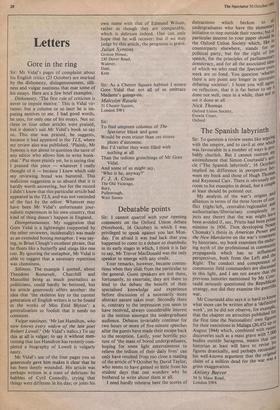The Spanish labyrinth
Sir: To question a review seems like arguing with the umpire, and to cavil at one which was favourable in a number of ways is Pro- bably churlish. But I cannot restrain laY astonishment that Simon Courtauld's 06' cle (`The Spanish labyrinth', 16 October) implied no difference in perspective bet- ween my book and those of Hugh Thomas and Raymond Carr. There is obviously not room to list examples in detail, but a couPle at least should be pointed out. My analysis of the war's origins and alliances in terms of the three forces of con' flict (right/left, centralist/regionalist and authoritarian/libertarian) completely re- jects any theory that the war might have been avoided if, say, Prieto had been prune minister in 1936. Then developing NO 4',', Chomsky's thesis in American Power an the New Mandarins on the war's treatment by historians, my book examines the endur; ing myth of the professional in communist propaganda which has so influenced perspectives, both from the Left and rile, Right. The conduct and competence of communist field commanders are discussed in this light, and I am not aware that the previous histories mentioned by Mr Cot- tauld seriously questioned the Republican strategy, nor did they examine the guerrilla war. Mr Courtauld also says it is hard to know what more can be written after a 'definitive work', yet he did not observe, for example' that the chapter on atrocities published for the first time the Nationalists' own figures for their executions in Malaga (20,452 uP to August 1944) which, combined with receT, discoveries such as a mass grave with bodies outside Saragossa, means that on! historian at least will have to revise. his figures drastically, and perhaps reconsider his well-known argument that the original claim of a million dead for the war Was a gross exaggeration.
Antony Beevor
54 St Maur Road, London SW6










































 Previous page
Previous page